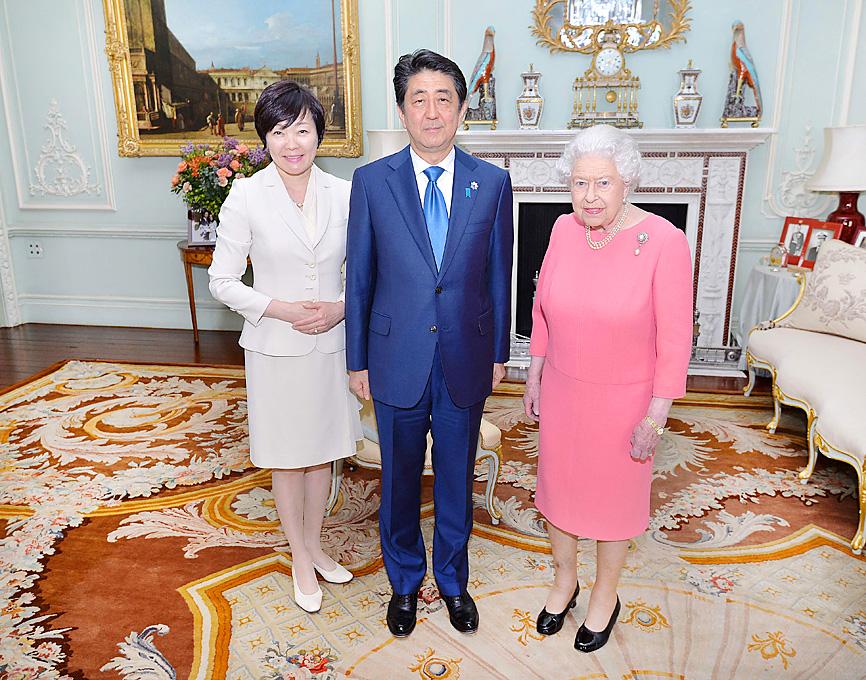Born into a prominent political family, former Japanese prime minister Shinzo Abe, who was shot dead at a campaign event in western Japan yesterday, had been the country’s longest-serving leader since World War II.
While credited with bringing a degree of stability to Japan following a period of economic malaise, Abe angered neighbors South Korea and China — along with many Japanese — with a rhetoric many deemed nationalistic and calls to revise the country’s pacifist constitution.
Abe was born in Tokyo on Sept. 21, 1954, the son of Shintaro Abe, who served as Japanese minister of foreign affairs from 1982 to 1986, and grandson of former Japanese prime minister Nobusuke Kishi.

Photo: AFP
He in 1977 graduated from Tokyo’s Seikei University with a degree in political science, after which he moved to the US to study public policy at the University of Southern California.
After returning to Japan and working in the management of a steel manufacturer for three years, he started to pursue a career at the Japanese Ministry of Foreign Affairs.
Running for the Liberal Democratic Party (LDP), he was in 1993 elected to parliament, representing the southwestern prefecture of Yamaguchi. Shinzo Abe, already viewed as a conservative at the time, was a member of the party’s Mori faction, which had once been headed by his father, who died in 1991.
Abe was in 2005 appointed Japanese chief cabinet secretary under then-Japanese prime minister Junichiro Koizumi. After leading negotiations to return Japanese abducted to North Korea, he was the same year elected head of the LDP.
On Sept. 26, 2006, he became prime minister for the first time, overseeing economic reforms while taking a hard line on North Korea and seeking to engage with South Korea and China.
Following electoral defeats that saw the LDP lose control of the legislature for the first time in 52 years, Abe in 2007 resigned as prime minister, citing health reasons.
In 2012, Abe became prime minister for a second time and a year later launched economic reforms dubbed “Abenomics.”
He served four terms, seeking closer ties with Western powers and distancing the country form China.
On Aug. 28, 2020, he announced that he would step down, again citing health reasons.
Despite leaving office, Abe in 2020 showed that he can still rile up Beijing with comments on Taiwan, warning that “military adventure would lead to economic suicide.”

A fire caused by a burst gas pipe yesterday spread to several homes and sent a fireball soaring into the sky outside Malaysia’s largest city, injuring more than 100 people. The towering inferno near a gas station in Putra Heights outside Kuala Lumpur was visible for kilometers and lasted for several hours. It happened during a public holiday as Muslims, who are the majority in Malaysia, celebrate the second day of Eid al-Fitr. National oil company Petronas said the fire started at one of its gas pipelines at 8:10am and the affected pipeline was later isolated. Disaster management officials said shutting the

US Vice President J.D. Vance on Friday accused Denmark of not having done enough to protect Greenland, when he visited the strategically placed and resource-rich Danish territory coveted by US President Donald Trump. Vance made his comment during a trip to the Pituffik Space Base in northwestern Greenland, a visit viewed by Copenhagen and Nuuk as a provocation. “Our message to Denmark is very simple: You have not done a good job by the people of Greenland,” Vance told a news conference. “You have under-invested in the people of Greenland, and you have under-invested in the security architecture of this

Japan unveiled a plan on Thursday to evacuate around 120,000 residents and tourists from its southern islets near Taiwan within six days in the event of an “emergency”. The plan was put together as “the security situation surrounding our nation grows severe” and with an “emergency” in mind, the government’s crisis management office said. Exactly what that emergency might be was left unspecified in the plan but it envisages the evacuation of around 120,000 people in five Japanese islets close to Taiwan. China claims Taiwan as part of its territory and has stepped up military pressure in recent years, including

UNREST: The authorities in Turkey arrested 13 Turkish journalists in five days, deported a BBC correspondent and on Thursday arrested a reporter from Sweden Waving flags and chanting slogans, many hundreds of thousands of anti-government demonstrators on Saturday rallied in Istanbul, Turkey, in defence of democracy after the arrest of Istanbul Mayor Ekrem Imamoglu which sparked Turkey’s worst street unrest in more than a decade. Under a cloudless blue sky, vast crowds gathered in Maltepe on the Asian side of Turkey’s biggest city on the eve of the Eid al-Fitr celebration which started yesterday, marking the end of Ramadan. Ozgur Ozel, chairman of the main opposition Republican People’s Party (CHP), which organized the rally, said there were 2.2 million people in the crowd, but